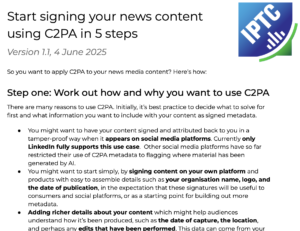Categories
Archives
The IPTC has released a guide helping news organisations to sign their news content using C2PA technology.
The guidance was launched at today’s Content Authenticity Summit in New York, co-hosted by IPTC along with the Content Authenticity Initiative and the Coalition for Content Provenance and Authenticity (C2PA).
The guide walks publishers and broadcasters through the steps of evaluating and understanding why they should want to implement content provenance at their organisation, and what they aim to achieve. The guide suggests some use cases and reasons that media organisations might want to consider while planning their implementation.
Next, the guide walks through how publishers can obtain a certificate from one of our Certificate Authority partners; submitting the certificate to the Verified News Publisher list, and signing content using your publisher certificate.
The IPTC Media Provenance Committee will adapt the guide over the coming months as the procedure evolves.
For questions on the guidelines or for any other issues regarding the IPTC Origin Verified News Publishers List, please contact IPTC.
The International Press Telecommunications Council (IPTC) is proud to co-host the 2025 Content Authenticity Summit, along with the Coalition for Content Provenance and Authenticity (C2PA) and the Content Authenticity Initiative (CAI). The event will be held tomorrow, Wednesday 4 June at the Cornell University campus on Roosevelt Island, New York City.
The Content Authenticity Summit will convene over 200 of the world’s foremost experts on digital content provenance including implementers, creators, and policymakers for a one-day series of presentations, panels, breakout sessions, and hands-on demonstrations to highlight the latest developments in this essential and fast-moving space.
The Summit, presented by the Content Authenticity Initiative, the Coalition for Content Provenance and Authenticity, and the International Press Telecommunications Council, will highlight current opportunities and challenges focused on driving broad awareness and adoption of Content Credentials.

Brendan Quinn, Managing Director of IPTC, will be hosting two workshops at the Content Authenticity Summit.
Many other IPTC members will also be represented:
- Adobe will have many representatives at the event, including Andy Parsons, Eric Scouten, Pia Blumenthal and Leonard Rosenthol
- Bruce MacCormack of CBC / Radio Canada, Chair of the Media Provenance Committee, will speak about C2PA adoption in the news media
- Helge O. Svela, CEO of Media Cluster Norway will co-host workshops on C2PA in the news industry.
- AFP and IMATAG will present a case study on their project to digitally sign content
- Charlie Halford of the BBC will co-host the workshop on C2PA metadata in the news industry
- Will Kreth of HAND Identity will be speaking about how provenance protects the identities of athletes and entertainers
- Sherif Hanna of Google will be speaking about the forthcoming C2PA Conformance process.
Other speakers include representatives from Meta, LinkedIn, OpenAI, Partnership on AI and Nikon.
We will report on the event later this week. If you’re attending, come and say hello to our members and to IPTC Managing Director Brendan Quinn.
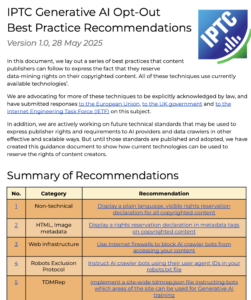
The IPTC has released a set of guidelines expressing best practices that publishers can follow to express the fact that they reserve data-mining rights on their copyrighted content.
All of the recommended techniques use currently available technologies. While the IPTC is advocating both for better acknowledgement in law of current techniques and for clearer, more stable and more scalable techniques for expressing data-mining opt-out, it is important to remember that opt-out can be expressed today, and that publishers shouldn’t wait for future standards to emerge if they want to control data mining rights on their copyrighted content.
Summary of the recommendations
For full detail, please view the PDF opt-out best practices guidelines. A summary of the guidance is provided below.
-
Display a plain-language, visible rights reservation declaration for all copyrighted content
To ensure no misrepresentation, ensure that copyright and rights reservations are plainly displayed to human readers. -
Display a rights reservation declaration in metadata tags on copyrighted content
Using schema.org, the IPTC Photo Metadata Standard and/or IPTC Video Metadata Hub, the same human-readable copyright notice and usage terms should be attached to media content where possible. -
Use Internet firewalls to block AI crawler bots from accessing your content
To ensure that crawlers that ignore robots.txt and other metadata cannot access your content, publishers can employ network-level protection to block crawler bots before they can reach your content. -
Instruct AI crawler bots using their user agent IDs in your robots.txt file
Seemingly the simplest method, this is actually one of the most difficult because each AI system’s crawler user-agent must be blocked separately. -
Implement a site-wide tdmrep.json file instructing bots which areas of the site can be used for Generative AI training
The Text and Data Mining Reservation Protocol can and should be used, in combination with other techniques. -
Use the trust.txt “datatrainingallowed” parameter to declare site-wide data mining restrictions or permissions
The trust.txt specification allows a publisher to declare a single, site-wide data mining reservation with a simple command:datatrainingallowed=no. Sites that already use trust.txt should add this parameter if they want to block their entire site from all AI data training. -
Use the IPTC Photo Metadata Data Mining property on images and video files
Announced previously by the IPTC and developed in collaboration with the PLUS Coalition, the Data Mining property allows asset-level control of data mining preferences. An added benefit is that the opt-out preferences travel along with the content, for example when an image supplied by a picture agency is published by one of their customers. -
Use the CAWG Training and Data Mining Assertion in C2PA-signed images and video files
For C2PA-signed content, a special assertion can be used to indicate data mining preferences. -
Use in-page metadata to declare whether robots can archive or cache page content
HTML meta tags can be used to signal to AI crawlers what should be done with content in web pages. We give specific recommendations in the guidelines. -
Use TDMRep HTML meta tags where appropriate to implement TDM declarations on a per-page basis
The HTML meta tag version of TDMRep can be used to convey rights reservations for individual web pages. -
Send Robots Exclusion Protocol directives in HTTP headers where appropriate
X-Robots-Tag headers to HTTP responses can be used alongside or instead of in-page metadata. -
Use TDMRep HTTP headers where appropriate to implement TDM declarations on a per-URL basis
TDMRep also has an HTTP version, so we recommend that it is used if the top-level tdmrep.json file cannot easily convery asset-level opt-out restrictions.
Feedback and comments welcome
The IPTC welcomes feedback and comments on the guidance. We expect to create further iterations of this document in the future as best practices and opt-out technologies change.
Please use the IPTC Contact Us form to provide feedback or ideas on how we could improve the guidance in the future.
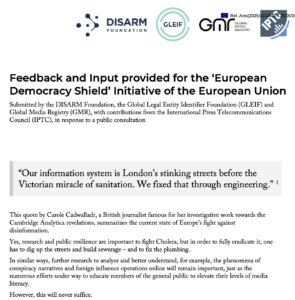
The IPTC has provided input to a submission made by the Global Media Registry to the European Commission’s European Democracy Shield consultation.
The GMR submission discusses the value of organisational identification:
The Importance of Identification and Attribution
Unambiguous attribution is in the best interest of anyone doing honest business. It is also a key requirement for consumer protection.
Not surprisingly, to “Know your Supplier” (KYS) and to “Know your Customer” (KYC) have become essential principles of securing supply chains in almost every industry. In turn, bad actors can capitalize on the absence of clear attribution by faking the identity of brands, vendors or buyers to deceit and to cheat – and to get away with it.
Exactly this happens currently in the field of disinformation, as far as the phenomenon of so-called “Doppelgangers” is concerned. It refers to anonymous imposters falsely claiming to be – among others – DER SPIEGEL, Le Monde, CBC/Radio-Canada, the BBC or CNN, to publish content online that would never appear in either of those highly acclaimed news outlets.
The C2PA specification, and IPTC’s efforts to implement it in the media industry through the IPTC Origin Verified News Publishers List, are recommended as critical means to identify media organisations in a way that is tamper-evident and traceable. Other means of identifying organisations mentioned in the paper include the Legal Entity Identifier (LEI), Global Media ID (which is promoted by Global Media Registry) and International Standard Content Code (ISCC).
The paper concludes:
As a response to the World Financial Crisis 2008/09, the Financial Stability Board of the G20 established a global system of legal entity identifiers, and eventually GLEIF, in order to fix a number of apparent vulnerabilities of the financial sector.
The European Commission should follow this example when designing the ‘Democracy Shield’ and support a global system of identification to fix a number of equally visible vulnerabilities of our shared information space.
Global Media Registry, a liaison partner of the IPTC, is one of the organisations behind the forthcoming ISO specification for a Global Media Identifier (GMI). The specification is currently going through the ISO standardisation process as ISO IWA 44:2025. The IPTC and some IPTC member organisations have participated in the drafting process.
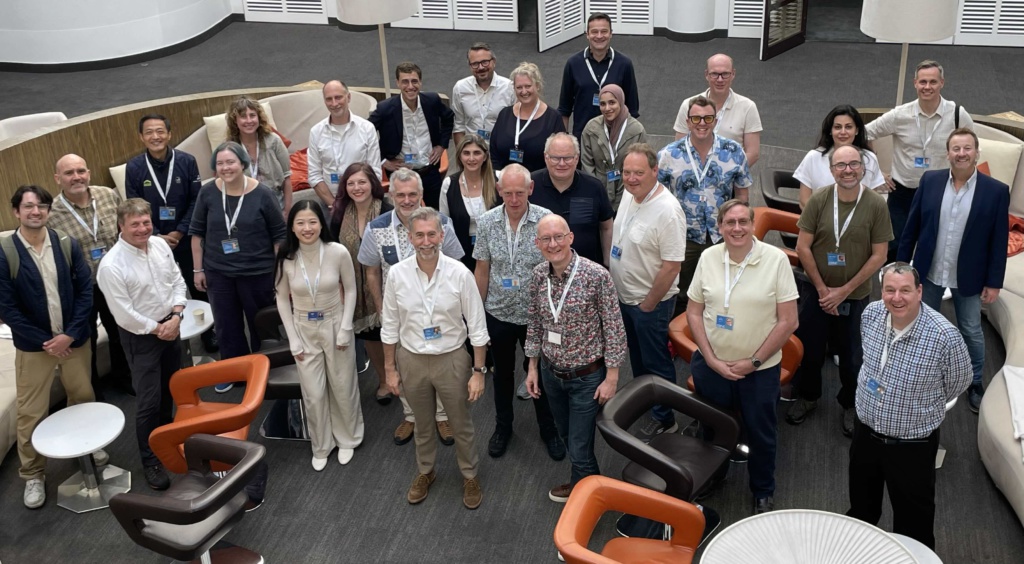
Over 60 senior technology, data and editorial staff from 43 top media companies around the world met in Juan les Pins, France and online for the IPTC Spring Meeting 2025.
Representatives from AP, AFP, BBC, Bloomberg, Getty Images, New York Times, Sinclair Broadcasting Group, Radio New Zealand, Broadcast Solutions Group, Qatar News Agency, Xinhua News Agency, Progress Software, Data Language / DataGraphs, National Geographic Society, OrangeLogic, Trufo.ai, Deutsche Welle, Profium, Athens Technology Centre and more joined us in Antibes. We discussed and shared best practices on AI in media, content provenance, knowledge graphs, AI opt-in and opt-out, and many other topics.
Highlights included:
- Julie McVey from the National Geographic Society speaking about a proof-of-concept project they undertook with their DAM vendor OrangeLogic and provenance technology provider Trufo to digitally sign their archive content
- Paul Wilton from Data Language showing how their DataGraphs product can be used to visualise sports information and link key moments to video clips, all based on IPTC’s Sport Schema model
- Invited guest Benjamin Sabbah from Reporters Without Borders speaking about the Journalism Trust Initiative, leading to a discussion about how we can create a vehicle for metadata about publishing organisations as well as metadata about individual content items
- Reports from the NewsML-G2 / News Architecture Working Group, the News in JSON Working Group and the Photo Metadata Working Group
Day 1 was held in conjunction with the CEPIC 2025 meeting, where we held panels about opt-in and opt-out for Generative AI training, C2PA and media provenance, blockchains for image archives and a hands-on workshop on photo metadata.
Members held the sort of productive discussions, debates and collaborations that can only happen in a face-to-face meeting.
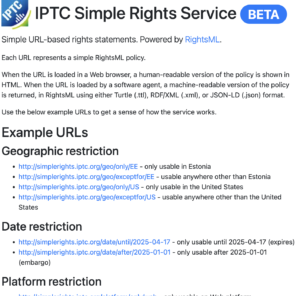
Based on ideas that have arisen at recent conversations and working sessions at IPTC member meetings, we have built a simple service that supports the most common news syndication rights restrictions and permissions. We call it simplerights.iptc.org.
Based on the IPTC’s RightsML standard, which is effectively the same as the W3C’s ODRL, the service allows simple RightsML restrictions to be expressed as simple web URIs (Uniform Resource Indicators). For example, a simple geographic restriction “may be used everywhere except Belgium” can be expressed as https://simplerights.iptc.org/geo/exceptfor/BE.
We have created simple expressions for the following restrictions:
Geographic restriction
- http://simplerights.iptc.org/geo/only/EE – only usable in Estonia
- http://simplerights.iptc.org/geo/exceptfor/EE – usable anywhere other than Estonia
- http://simplerights.iptc.org/geo/only/US – only usable in the United States
- http://simplerights.iptc.org/geo/exceptfor/US – usable anywhere other than the United States
Date restriction
- http://simplerights.iptc.org/date/until/2025-04-17 – only usable until 2025-04-17 (expires)
- http://simplerights.iptc.org/date/after/2025-01-01 – only usable after 2025-01-01 (embargo)
Platform restriction
- http://simplerights.iptc.org/platform/only/web – only usable on Web platform
- http://simplerights.iptc.org/platform/exceptfor/tv – not usable on TV
See Usage Terms restriction
- http://simplerights.iptc.org/seeterms – consumer must consult Usage Terms information to determine rights
If these URLs are accessed over the web, then they return a human-readable web page explaining the restriction.
If the same URLs are accessed by software, then various forms of the ODRL policy are returned. The request can return RDF information in JSON-LD, RDF/XML and Turtle formats, depending on the query parameters or HTTP Accept headers provided in the request. This mechanism is known as HTTP Content Negotiation.
For more complicated RightsML / ODRL constraints, the RightsML Generator that we announced earlier this week may be useful. This tool will allow users to generate rights statements that include more than one restriction at the same time, which is something that the simplerights service cannot currently do.
simplerights.iptc.org is released as a beta service and should not be relied upon in production at this stage. We reserve the right to change the API and URI structure in the final version of the service.
We see this service as potentially a step towards a commercial rights expressions service that is as simple to use as Creative Commons URL-based licences for common, simple use cases.
The simplerights.iptc.org service will be presented at the IPTC Spring Meeting which will be held in Juan les Pins, France from Wednesday to Friday of this week (14-16 May 2025).
We welcome feedback on the usefulness of the service and how we could improve it in the future. Please contact the IPTC via our Contact Form if you have feedback or suggestions.
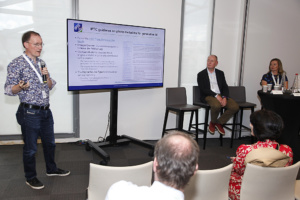
Next week, speakers from the National Geographic Society, Journalism Trust Initiative, Peking University and more will be presenting at the IPTC Spring Meeting in Juan les Pins, France.
This year’s event is being held in collaboration with CEPIC, the industry group for the image licensing industry, with whom IPTC has a long association. The CEPIC event is being held from Monday to Wednesday, and the IPTC event is from the Wednesday to Friday, so we can enjoy a crossover day where CEPIC attendees will be able to hear from IPTC speakers and vice versa.
Speakers and panels include:
- A panel discussion on AI opt-out best practices, discussing what publishers can practically do in today’s ecosystem to ensure that they have control over whether AI crawlers can index their content
- Several presentations on C2PA and Media Provenance, including a presentation of a proof-of-concept by the National Geographic Society working with Orange Logic and Trufo. We will also be holding a meeting of the IPTC Media Provenance Committee and workshops on metadata for C2PA in the news media industry
- Presentation from IPTC member Data Language on their recent work implementing IPTC Sport Schema in their Data Graphs platform
- Invited speakers from Peking University, working with IPTC member Xinhua News Agency, on pre-training AI models for media
- Presentations from each IPTC Working Group: NewsML-G2, News in JSON, Photo Metadata, Video Metadata, NewsCodes, Sports Content
Of course there will also be time for attendees to discuss shared issues in person with their peers from other companies around the globe.
Virtual attendance is still available. IPTC members should fill in the attendance form linked from the event page in the IPTC Members Only Zone.
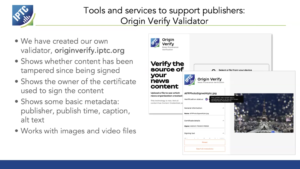
Brendan Quinn of IPTC presented alongside Leonard Rosenthol of C2PA at the World-Wide Web Consortium (W3C)’s Authentic Web workshop series this week.
This was the second in a series of online workshops run by the W3C in an effort to bring together the various work on trust, provenance, credibility and authenticity. The first part of the Authentic Web workshop was run in March 2025.
Leonard presented C2PA, its motivations and work done so far, including describing how C2PA technology is currently used by platforms such as LinkedIn and TikTok, and by most generative AI tools to signal AI-generated content.
Then Brendan went on to describe how the IPTC’s Media Provenance Committee has established the Verified News Publisher programme, an industry specific “trust list” of media organisations who are using C2PA certificates to sign their published content.
W3C events mostly run in the open, so the session agenda, pre-read material, minutes and even a video recording of the presentation part of the workshop are all available online, even to non-members. As per W3C policy, the discussion portion of the event was not recorded. This allows for more open discussion.
Present at the workshop were representatives of Google Chrome and Mozilla, the W3C’s Technical Architecture Group (TAG), hardware and software vendors, and others with an interest in the idea of implementing content provenance solutions in their tools.
Depending on the outcome of discussions within the group and at further workshops, this work may lead to a physical meeting later this year.
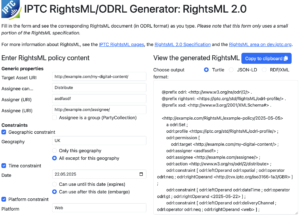
The IPTC has created a RightsML Generator tool that shows how easy it can be to generate simple RightsML documents expressing a range of permissions and obligations around the use of media content.
RightsML is the IPTC’s standard for expressing rights usage statements that can be used for all types of media content, from images and video clips through to AI data, data sets and 3D models. Since version 2.0, RightsML has been based on the World Wide Web Consortium (W3C)‘s Open Digital Rights Language (ODRL); in fact IPTC members worked closely with the W3C to create the current version of ODRL to align with RightsML.
A common complaint among users and potential users of RightsML and ODRL was that it is too complicated to be implemented easily. To answer these issues, we wanted to show that describing rights in RightsML can be relatively simple, especially for common news workflows and rights statements such as:
- “this content may be distributed in all countries except the UK” or “only in the UK” (a common use case for news and image licensing agencies that have operations in one country but allow other agencies to distribute their content in other countries)
- “this content may be published any time after XX date” (a simple “embargo”)
- “this content may be published any time until YY date” (a content expiry notice, which might apply to customers with certain types of licence)
- “this content may be published only on mobile platforms” or “only in print” (based on licensing agreements)
- “this content may be published only to those who have paid a licensing fee”
- or a combination of the above constraints.
To demonstrate these possibilities, we have created a simple form-based tool that generates the relevant RightsML/ODRL document. The user can choose whether to express the RightsML statements in various RDF formats: Turtle, RDF/XML and JSON-LD.
The RightsML generator tool can be accessed at https://iptc.org/std/RightsML/generator/.
Please contact IPTC or post on the public iptc-rightsml discussion group with any feedback or comments. We would love to hear from current and potential users of RightsML to learn how we can make the ecosystem easier for you.

The following is a guest post from Helge O. Svela, CEO of Media Cluster Norway. Media Cluster Norway joined the IPTC as Associate Members of IPTC in 2024 and Helge is the lead of the Provenance Best Practices and Implementation Working Group, where news publishers work together to talk about their progress in implementing C2PA and the IPTC Verified News Publisher programme within their organisations.
In this article, Helge introduces Project Reynir, an initiative to bring secure media signing technology to the Norwegian media industry.
The journalistic institution must rethink how it develops and applies technology if society is to stand a chance against the deluge of fake images and video from generative AI. Never before in human history has it been easier to produce realistic, but fake, images and video, and spread them around the world. The rapid technological development of generative artificial intelligence has turbocharged the engines of disinformation, and caught both society and journalism off-guard. Never have we been more vulnerable.
Disinformation is destabilising our democracies, and spreading erroneous information. This potentially has severe consequences for both democratic processes and for the public in the face of natural disasters and other crises. The first round of the Romanian elections in 2024 was annulled due to what was dubbed an “algorithmic invasion” of social media disinformation. In the aftermath of the earthquake in Myanmar in March, AI-generated videos of the devastating destruction shared by so called “engagement farmers”, likely with financial motives, got millions of views on social media.
Generative AI has given humanity the ability to create realistic videos and images simply by typing a few words into a website. However, these tools also quickly became a part of the arsenal for enemies of democracy. As a result, disinformation is becoming more prevalent, appearing more professional and costing almost nothing to produce. Generative AI is an industrial revolution also for the troll factories in Russia and others who seek to manipulate our perception of the world and sow doubt about what is true.
This is not a media problem. It is a democratic problem, and a dangerous one at that. Disinformation created by troll factories and generative artificial intelligence and spread by bots pose an immediate threat to our democracies. We might end up doubting absolutely everything. When anyone can claim anything is generated and fake, the liars come out on top. This could destroy the foundation of our democracies: trust in each other and in our institutions. One thing is current news, another is history. Imagine a dictator using fake historical footage of a hunger catastrophe in order to justify an ethnic cleansing of a minority. An internet flooded with claims and visual “proof” of what happened in the past, all of which looks authentic. As a result of generative AI this is no longer just a dystopian science fiction scenario. It is a real possibility. Never before have we needed editorial media more. However, the signal strength of editorial media risks being drowned out by an ever growing cacophony of junk content and disinformation.
Project Reynir is our response to the threat Generative AI poses. Because Generative AI makes it so easy to fake both content and sender, editorial media are under threat on two fronts. In Project Reynir, we aim to solve this problem using technical solutions.
The goal is to create something that makes it easier for ordinary people to distinguish between what is fake and what is real. By using cryptographically secured images and video, based on the open C2PA specification, it is possible for both newsrooms and regular media users to be confident that the images we are seeing have not been tampered with on their journey from the photographer’s lens to the mobile screen. Moreover, using the same technology, authenticity markers can be added to the images and videos from news publishers when they post stories on social media and other third party platforms. Thus guaranteeing that content that appears to be the BBC and AFP actually is from these news organisations and not someone impersonating them. If we succeed, we will be a significant step closer to solving the problem of artificially created noise for our present moment. Project Reynir unites newsrooms, media technology companies and academic researchers in the fight against disinformation. Our goal is an 80 percent adoption in the Norwegian news ecosystem, and to serve as a beacon of best practices for the rest of the world of news.
We believe that time is critical, and that all good forces now must unite. The technological development has moved rapidly in the last few years, and the adoption of technology has sometimes been irresponsible. If our democracies are to stand firm in the face of the disinformation tsunami we are facing, quality journalism must be empowered. Only then can we enable citizens to make informed choices free of manipulation and interference, in an environment where facts can be easily distinguished from lies. We call for the democratic governments of the world to invest in innovation in the news media space. The time for responsible tech innovation, made with resilient democracies in mind, is now.
This article was originally published in the report Seeking Truth, Ensuring Quality: Journalistic Weapons in the Age of Disinformation, published by the University of Bergen in collaboration with Media Cluster Norway, as a part of the Journalistic Weapons conference organised in Brussels on April 28 2025. The full report, including articles from Faktisk, the European Federation of Journalists, London School of Economics, the Center for Investigative Journalism Norway and others, is available at https://www.uib.no/sites/w3.uib.no/files/attachments/publication_seeking_truth_ensuring_quality.pdf.
Categories
Archives
- January 2026
- December 2025
- November 2025
- October 2025
- September 2025
- August 2025
- July 2025
- June 2025
- May 2025
- April 2025
- March 2025
- February 2025
- January 2025
- December 2024
- November 2024
- October 2024
- September 2024
- August 2024
- July 2024
- June 2024
- May 2024
- April 2024
- March 2024
- February 2024
- December 2023
- November 2023
- October 2023
- September 2023
- August 2023
- July 2023
- June 2023
- May 2023
- March 2023
- February 2023
- January 2023
- December 2022
- November 2022
- October 2022
- September 2022
- August 2022
- July 2022
- June 2022
- May 2022
- April 2022
- March 2022
- February 2022
- January 2022
- December 2021
- November 2021
- October 2021
- September 2021
- August 2021
- July 2021
- June 2021
- May 2021
- April 2021
- February 2021
- December 2020
- November 2020
- October 2020
- September 2020
- August 2020
- July 2020
- June 2020
- May 2020
- April 2020
- March 2020
- February 2020
- December 2019
- November 2019
- October 2019
- September 2019
- July 2019
- June 2019
- May 2019
- April 2019
- February 2019
- November 2018
- October 2018
- September 2018
- August 2018
- July 2018
- June 2018
- May 2018
- April 2018
- March 2018
- January 2018
- November 2017
- October 2017
- September 2017
- August 2017
- June 2017
- May 2017
- April 2017
- December 2016
- November 2016
- October 2016
- September 2016
- August 2016
- July 2016
- June 2016
- May 2016
- April 2016
- February 2016
- January 2016
- December 2015
- November 2015
- October 2015
- September 2015
- June 2015
- April 2015
- March 2015
- February 2015
- November 2014
